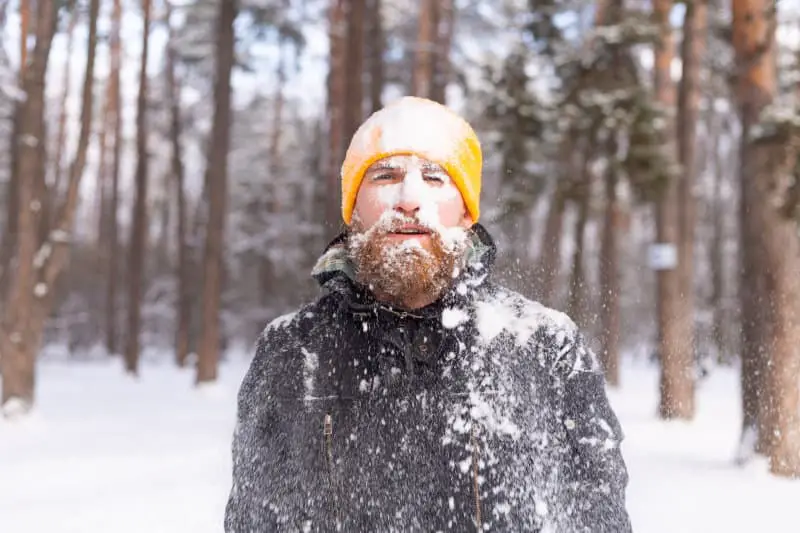Sometimes, it feels like there’s nothing a beard can’t do. If you’re reading this site, you’ve probably found that your beard makes you feel more confident, attractive, and masculine. Plenty of research has determined that women find facial hair quite sexy when seeking a mate. But does a beard actually protect you?
While little evidence exists that beards are an evolutionary defense mechanism, they can protect your face in a variety of ways. A full beard will protect against cold, shield skin from UV rays, and promote clearer skin that ages slower. Beards also serve as a natural barrier to airborne toxins.
Read on to dig in a bit deeper on this question. We will separate proven facts from myths as we move along.
Evolution and the Bearded Man
From an evolutionary standpoint, human beards are peculiar. Pretty much all other hair has a clear biological purpose. The hair on your head protects your scalp from exposure. Your eyelashes and eyebrows keep things from getting into your eyeballs. Pubic hair catches toxic agents before they reach the family jewels.
Facial hair is odd by comparison. To start with, only about half of adult humans can grow it. The hair on women’s faces never proceeds past the fuzzy vellus that children have. So, facial hair cannot have the same biological defense imperatives that our other hair does. If it did, everyone would be able to grow it.
With one possible caveat that we’ll discuss later, beard hair’s evolutionary purpose seems to be exclusively ornamental. A beard tends to hold onto more of men’s naturally-excreted pheromones than a clean-shaven face would. Additionally, women report associating full facial hair with dominance, competence, maturity, and masculinity. In short, men probably grow beards to attract a mate.
At least, that’s probably its apparent biological purpose.
Men have all sorts of reasons to want a good beard beyond the animal instinct to pass on our genes. By the same token, even if facial hair’s raison d’etre isn’t protective, it does offer some tangible defenses for your face. Let’s break them down.
1. Shelter from the Storm
How many times have you walked into a brisk winter morning, and all around you, men and women have their scarves pulled over their mouths and noses while you feel comfortable in the face region? Why would that be?
Obviously, it’s the thicket of full, insulating hair covering the lower part of your head. As the temperature drops, hirsute men have an extra layer of thermal protection in an area that is particularly susceptible to heat loss.
Enjoy this fringe benefit of a healthy face pelt, but be careful in really inclement weather. Facial hair may warm you in the short term, but it also catches snow, sleet, and freezing rain. If you don’t wipe that away, you could find yourself sniffling.
2. The Perfect Sunblock
Just as a beard protects you against the cold in the winter, it can also shield your skin from UV rays in the glaring summer heat.
In 2011, researchers at the University of Southern Queensland conducted a study that found that strong facial hair can block up to 95% of UV rays from the sun. This was significant enough, they concluded, that having a beard reduces a man’s overall likelihood of developing skin cancer. Plus, they prevent painful sunburns.
One note of caution, however: a dark beard will absorb a lot of heat in the beating sun. You may want to bring a hand-fan or a spray bottle full of cold water to the beach.
3. A Biological Air Filter
As mentioned earlier, a lot of hair developed over many eons to protect humans from airborne toxins. While that might not be the proven reason we have beards, it is a definite bonus that beardsmen enjoy.
Here are just a few of the observed respiratory benefits of having facial hair:
- Beard and mustache hairs catch deleterious particles trying to enter your mouth and nose, reducing your risk of throat disease.
- This filtration has been shown to reduce asthma attacks.
- Bad allergies? Facial hair also filters pollen and other allergens to reduce your sneezing.
So, you can rest a bit easier, secure in the knowledge that your beard is working overtime to filter the air entering your lungs.
4. A Natural Face Freshener
On average, shaving exposes your skin to all sorts of nasty infiltrators. Once the stubble comes off, your pores are wide open, and there are hundreds of tiny (and sometimes not-so-tiny) abrasions on your face. It is open season for nefarious bacteria and pimple-producing grit.
Moreover, so many shaving products dry out your skin. Soon your sebaceous glands are flooding the skin on your face with oil, further clogging your pores.
Then, you have the risk of ingrown hairs. This all adds up to an acne production line. However, if you choose to go the bearded route, you can largely kiss this vicious cycle behind. Your skin will thank you!
What’s more, the good habits beardsmen practice on their manes further help produce clearer skin. Beard shampoos, conditioners, moisturizers, oils, and balms all use ingredients meant to hydrate your face and reduce blemishes.
5. An Anti-Aging Hack
UV ray production, a shield against frigid conditions, filtration from toxins, acne reduction – in total, these benefits amount to slowing down time.
So much of the aging process involves our skin being weathered by the world around us. Having robust facial hair between your face and the elements is a genuine anti-aging hack.
It’s not like your face cryogenically freezes when you grow a beard, but you can expect less discoloration and pocking from skin blemishes. You might also find skin-wrinkling slowed, all thanks to that attractive fur on your face.
6. Your First Defense in a Fight

We mentioned at the beginning that there was one possible evolutionary benefit that facial hair serves besides mere ornamentation. It might help you take a punch.
Charles Darwin suggested that a solid mane around a male lion’s head was partly there to protect it in combat. In 2020, researchers tested this theory, using sheep’s wool to protect human skull fragments in an automated impact device. They concluded that the impact of a percussive blow against bone was deadened by as much as 30% by hair. Essentially, it distributed the force outward across the whole mane.
Does this mean that male humans developed beards as a little padding to absorb blows in combat? That’s a damned compelling notion!
The Verdict
While the male beard may not have emerged as an evolutionary defense, in the contemporary world, it definitely protects us. Whether from the sun, the cold, pollen, bacteria, or a nasty left hook, you should feel a little more secure as a full beardsman.
We mentioned facial hair’s ornamental value. Be sure to check out our articles on the great aesthetic questions of beard growth, including whether it should cover your upper lip or be longer at your chin.

